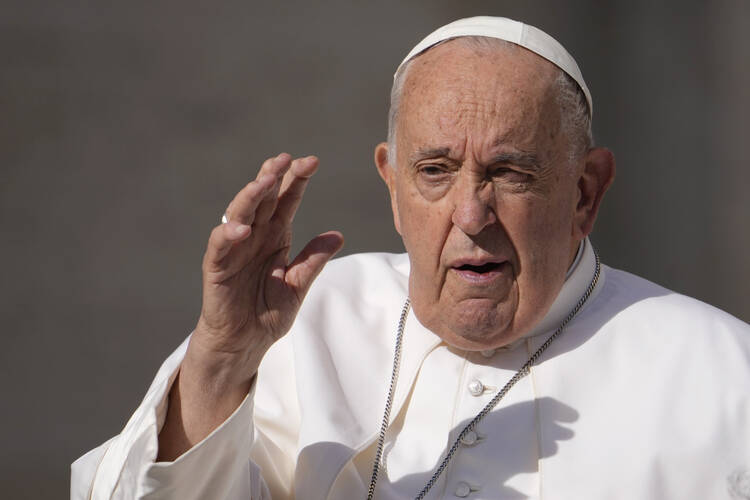Pope Francis’ remarks to the Italian bishops’ conference regarding homosexuals and entry to the seminary were “taken out of context and used to divide” by whoever leaked them to the press, the vice president of the conference told the leading Italian daily, Il Corriere della Sera, on May 29.
On Monday, May 27, Italian media reported that the pope, in a closed-door meeting with the Italian bishops, used the word “frociaggine,” an anti-gay slur, in a discussion about the culture at seminaries.
“The pope is not homophobic and never was,” Bishop Francesco Savino of the southern Italian Diocese of Cassano all’Jonio, 69, said. He denied that, in his conversation with the Italian bishops on May 20, Pope Francis gave a categorical “no” to the entry of homosexuals to the seminary. “There is not an a priori no” to them, he said. “His true concern is the serenity of all. The pope wanted to say that the candidates [for the priesthood and entry to the seminary], whether homo[sexual] or hetero[sexual], should be capable of living well their promises with respect to obedience, poverty and chastity; to love with a full heart and empty hands.”
On Tuesday, the Holy See Press Office said in a statement, “Pope Francis never intended to offend or to express himself in homophobic terms, and he apologizes to those who felt offended by the use of a word, referred [to] by others.”
Bishop Savino told the Vatican correspondent for Il Corriere della Sera, Gian Guido Vecchi, “What is painful, however, is the misunderstanding of what he said. The diabolic will, in the literal Greek sense of the word—dià-bollo, to divide…”
[Pope Francis used an anti-gay slur. What now for L.G.B.T.Q. Catholics?]
He recalled that at the beginning of the biannual assemblies of the Italian bishops’ conference, “we bishops meet the pope and we dialogue in private with great freedom, because the pope himself tells us to say what we are thinking without fear and with frankness, with the parrhesia of the Gospel.”
Bishop Savino said he does not know which of the more than 200 bishops at the plenary assembly on May 20 leaked the pope’s words to the press. He slammed this grave breach of confidentiality. But, he said, “whoever it was will have to come to terms with his conscience and with the sense of collegiality with the other bishops.”
Though Bishop Savino did not address the pope’s reported use of the offensive term, he explained that a “unilateral and misleading reading” of what the pope actually said had been leaked to outsiders. And apart from the fact that Francis “comes from Latin America and Italian is not his own language,” he said, it is “a fundamental hermeneutical principle” that “a word or phrase taken out of the context in which they were pronounced can convey a totally different message to the authentic one.”
He provided context for the pope’s remarks:
Francis, as a great educator, was talking about the formation of candidates for the priesthood. He was concerned about the happiness of the future priest, whether he be homosexual or heterosexual, because a priest must be serene [at peace] with himself, a man who has come to terms with himself and is happy, and is able to transmit joy. And happiness passes also through a harmonious relationship with his own sexuality.
Last November in Assisi, the Italian bishops approved by a majority vote a text in which they distinguished between homosexual “tendencies” and “acts.” In the document on formation for the priesthood, the bishops did not bar homosexual men from entry to the seminary as such, instead only barring men who could not maintain the commitment to chastity.
Asked whether Pope Francis’ remarks to the Italian bishops’ assembly went contrary to that, Bishop Savino replied: “Absolutely no! The concern of the pope was essentially educative, in the sense of holistic, complete education of the person: You must be accompanied in a process of formation that permits you to be faithful to your ordination.” He added, “It makes no sense to think that Francis gave a homophobic address.”
Bishop Savino recalled that at the beginning of his pontificate, Francis said “Who am I to judge?” in response to a question about gay priests, and more recently, the pope permitted the pastoral blessing of couples in same-sex relationships, drawing criticism from some in the church.
“He has always been attentive and respectful on the subject of homosexuality. And from his first pastoral document, the exhortation ‘Evangelii Gaudium,’ and throughout his entire pontificate the key proposal has always been inclusion,” Bishop Savino said. He recalled that, as the Vatican statement yesterday said, Francis has always said, “The church welcomes everyone, everyone, everyone.”
He confirmed that the Italian bishops’ document on the formation for the priesthood is being examined by the Holy See and recalled one of the synod working groups is reflecting on the question. Bishop Savino predicted that reflection on formation will “certainly continue.” He quoted the words of the famous Italian Jesuit cardinal, Carlo Maria Martini, who said, “It is the questions, more than the answers, that help us to grow.”








